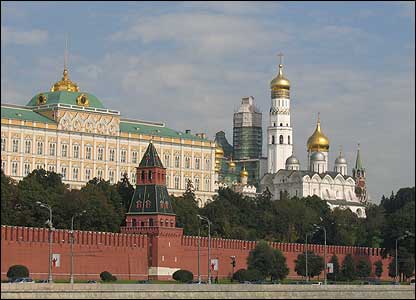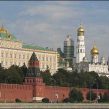
WILL RUSSIA’S NEXT ANTI-CORRUPTION CAMPAIGN SUCCEED WHERE OTHERS FAILED?
Publication: Eurasia Daily Monitor Volume: 5 Issue: 18
By:

In his January 22 speech to the Civic Forum, a gathering of representatives from Russian non-governmental organizations and other groups sponsored by the Kremlin-appointed Public Chamber, President Vladimir Putin’s likely successor declared that the fight against corruption must become a “national program.” First Deputy Prime Minister Dmitry Medvedev also called Russia a country of “legal nihilism” that manifests itself in the form of “crime,” including “corruption in the power bodies,” which, he said, exists on a “huge scale” in Russia today. No European country can boast of such “disdain for the law,” Medvedev said. The heir apparent returned to this theme in his January 29 speech to a convention of the Association of Russian Lawyers, where he is chairman of the board of trustees, calling on fellow lawyers to take a more prominent role in society and to battle “legal nihilism” (Moscow Times, January 30).
Fighting corruption is, without doubt, the hardy perennial of Russian politics. Back in 1994, then-president Boris Yeltsin declared in his annual state-of-the-nation address that the mafia had Russia “by the throat” and that the population was at the mercy of an army of corrupt bureaucrats. He returned to the theme again in his 1997 state-of-the-nation address, stating that the public had lost faith in the government’s ability to halt “the onslaught of crime” and blaming state bureaucrats “who think only about their own well-being” for this sorry state of affairs. Yet despite the appointment of yet another team of putative “reformers” to deal with the problem, Yeltsin ended his presidency in 1999 mired in accusations of corruption within his own inner circle.
Vladimir Putin began his presidency promising to end the disorder of the Yeltsin era and to establish a “dictatorship of law.” He then proceeded to jail a leading tycoon, whose only real difference from the country’s other tycoons was that the media outlets he owned were openly critical of the Kremlin. While Putin continued to move against the oligarchs selectively – and, on the pretext of imposing order, moved to centralize power and curtail Russia’s already-stunted and illiberal democracy – little seemed to change in terms of overall corruption in Russia.
Indeed, according to one indicator – Transparency International’s annual Corruption Perceptions Index (CPI), which measures perceived corruption around the world based on polls and surveys – corruption in Russia remained rather stable between 1998 and 2007, reaching a “high” of 2.1 out of 10 in 2000 and a “low” of 2.8 in 2004 (on a scale in which a score of 10 means no corruption and a score of 0 means total corruption). For 2007, the Berlin-based corruption watchdog gave Russia a score of 2.3 (compared with 2.4 in each of the final two years of the Yeltsin era, 1998 and 1999) and put it in 143rd place out of 179 countries – a spot shared with Gambia, Indonesia, and Togo, just ahead of (that is, slightly more corrupt than) Syria and right behind (slightly less corrupt than) Angola.
The CPI would seem to bear out Medvedev’s observation that corruption in Russia’s “power bodies” exists on a “huge scale” – all of which, it might be added, constitutes a damning indictment of the efficacy of Putin’s “dictatorship of the law.” Yet according to at least one observer, the situation is even worse that Transparency International’s CPI would indicate.
Georgy Satarov, the former Yeltsin aide who heads the INDEM Foundation, which has extensively studied the issue of corruption, wrote on the Ezhednevny Zhurnal website earlier this week: “The growth in business corruption recorded by our diagnostic sociological research of corruption in 2001 and 2005 can be called catastrophic. Judge for yourself. The growth of the average size of a bribe during the period can be characterized as follows, taking into consideration inflation, GDP growth, the turnover of firms, and other economic dynamics. In 2001, an average-sized bribe could buy 30 square meters of habitation according to the average Russian prices on the primary [real estate] market (a piece of a single-room apartment). In 2005, an average sized bribe could buy 209 square meters – [a few] apartments. Is it any surprise that youth now want to be officials, and not businessmen?” (Ej.ru, January 28).
According to Satarov, INDEM’s research found that the size of the bribe required to be named a government minister during the Putin period was 150 times higher than during the Yeltsin period and that while standard size of a kickback in 2000 was 10-15% of the value of the government contract, order, purchase, etc., it reached 30-50 % by 2005 and today is in the range of 50-70%. Satarov also cited the magazine Ekspert as reporting in 2005 that approximately 80% of the federal funds allocated for military R&D projects was stolen and quoted former Economic Development and Trade Minister German Gref as saying that after he sharply reduced the number of types of activities requiring licensing, the size of bribes in those areas that still required licenses grew ten-fold (Ej.ru, January 28).
Thus while it is possible that Medvedev’s declared battle against “legal nihilism” might succeed where Yeltsin’s pledges to fight corruption and Putin’s “dictatorship of the law” failed, it may be time to recall the phrase made famous by former prime minister Viktor Chernomyrdin: Khotelos kak luchshe, a poluchilos kak vsegda – “We wanted better, but it turned out as always.”




